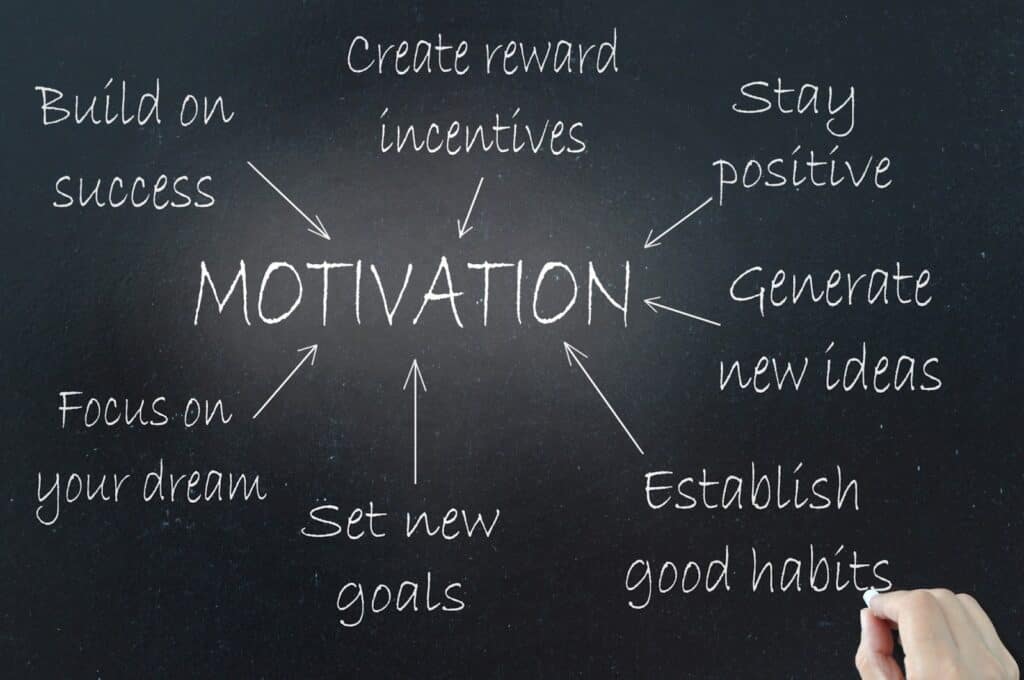
Self-discipline and motivation are two important concepts in personal development and achieving success. Both are essential for achieving goals and living a happy, successful life.
However, they are not the same thing. So what is the difference between self-discipline vs motivation?
Self-discipline refers to the consistent application of effort and control over one’s actions, regardless of fluctuating emotions or desires. In contrast, motivation is the driving force or incentive that initiates and maintains goal-oriented behaviors. While motivation gets you going, self-discipline keeps you going.
While both self-discipline and motivation play important roles in our lives, they become particularly important for staying strong during hard times.
Moreover, self-discipline and motivation each have their own unique benefits and drawbacks, and understanding them is a key step towards harnessing them both to create the life you want.
Let’s take a look at how self-discipline and motivation work, and how they can help you get the most out of your life. But before comparing them, let’s understand their basic definitions.
What is Self-Discipline?
“We are what we repeatedly do. Excellence, then, is not an act, but a habit.”
— Aristotle
Self-discipline, the quiet engine of progress, manifests as a steadfast commitment to long-term goals, unfazed by immediate desires or fleeting emotions.
This intrinsic trait fuels an individual’s ability to focus on what they wish to accomplish, often associated with personal development, fitness endeavors, or career advancements. It’s the silent guardian against the seductions of procrastination and instant gratification.
Self-discipline is less about harsh restrictions and more about self-regulation and understanding one’s own limitations and strengths.
It is the practice of training one’s self to work toward goals in a consistent and controlled manner. This quality is essential for anyone aiming to achieve their goals, especially those that require long-term planning and sustained effort.
It is the bridge between intentions and accomplishments, turning aspirations into tangible achievements.
Key Elements of Self-Discipline:
-
Consistency: Regular effort is more crucial than intensity.
-
Prioritization: Focusing on what truly matters.
-
Delaying Gratification: Foregoing short-term pleasure for long-term gains.
-
Resilience: Overcoming setbacks and maintaining focus.
-
Goal Setting: Defining clear, attainable objectives.
-
Self-Awareness: Recognizing personal weaknesses and strengths.
What is Motivation?
“The way to get started is to quit talking and begin doing.”
— Walt Disney
Motivation, the spark that ignites action, is the driving force behind all forms of human endeavor. It’s an amalgamation of reasons, desires, and needs that inspire and propel us forward to achieving our dreams.
There are two main types of motivation: intrinsic and extrinsic.
Intrinsic motivation
Intrinsic motivation, which comes from within, is particularly potent, as it drives individuals to act for the sake of personal satisfaction or interest, rather than external rewards or pressures.
Extrinsic motivation
Extrinsic motivation, on the other hand, is fueled by external rewards or recognition.
The most enduring and powerful form of motivation is often intrinsic, as it is self-generated and aligned with personal values
Vital Aspects of Motivation:
-
Goal Alignment: Ensuring actions are in sync with personal values and objectives.
-
Inspiration: Drawing motivation from various sources, including role models and personal experiences.
-
Emotional Intelligence: Managing emotions to sustain motivational levels.
-
Flexibility: Adapting goals and methods as circumstances change.
-
Self-Encouragement: Cultivating a positive self-dialogue to maintain motivation.
The relationship between motivation and discipline is clear since both are vital aspects of personal growth and achievement. They act as twin forces, each playing a distinct yet complementary role in our journey towards realizing our fullest potential.
What is the difference between self-discipline vs motivation?

The differences between motivation vs discipline can be subtle, but they’re also important. The following are some of the major differences between self-disciplined and self-motivated:
Self-Discipline is Habit-Driven; Motivation is Feeling-Driven.
Self-discipline emerges from established habits, the ones that form the backbone of daily life. It’s the repeated actions, the rituals that don’t require a second thought. In contrast, motivation is often a burst of feeling, an emotional catalyst that propels you forward.
While motivation can start the engine, it’s self-discipline that ensures the journey continues regardless of the emotional terrain.
-
Self-discipline thrives on routine.
-
Motivation surges with emotion.
-
Habits fuel discipline, while feelings fuel motivation.
Self-Discipline Ensures Consistency; Motivation Fluctuates.
Consistency is the hallmark of self-discipline. It’s the steadfast commitment to getting it done, even when the initial spark of motivation has dimmed.
On the other hand, motivation can be fleeting, ebbing, and flowing with moods and circumstances. Self-discipline is what keeps you moving forward when motivation waves goodbye.
-
Consistency comes from discipline, not motivation.
-
Motivation changes; discipline holds.
-
Discipline is the steady path; motivation is the unpredictable wind.
Self-Discipline is a Skill; Motivation is an Emotion.
Viewing self-discipline as a skill underscores its learnable, practicable nature. Like any skill, it takes discipline to cultivate and refine.
Motivation, in contrast, is similar to an emotional state – powerful but transient. It’s the spark, the initial excitement, but not the enduring force. Discipline helps bridge the gap between aspiration and achievement, turning the ephemeral fire of motivation into lasting progress.
-
Discipline can be learned; motivation is felt.
-
Skill versus emotion: the discipline-motivation dichotomy.
-
Discipline grows with practice; motivation responds to stimuli.
Self-Discipline Breeds Long-Term Success; Motivation Sparks Short-Term Action.
Self-discipline serves as the foundation for long-term success. It’s the steadfast commitment to progress, regardless of immediate rewards or recognition. This discipline is what enables individuals to maintain focus on their long-term goals, even when short-term temptations beckon.
Conversely, motivation often sparks short-term action. It’s the surge of energy that gets you started, but it might not last through the long haul. While motivation can kickstart a new habit, it’s the discipline that ensures the continuation and completion of that journey.
-
Long-term success relies on discipline, not just motivation.
-
Motivation gets you started; discipline keeps you going.
-
Discipline ensures progress despite the absence of immediate rewards.
Self-Discipline Fosters Resilience; Motivation Can Wane Under Pressure.
Resilience, the ability to bounce back from setbacks, is closely tied to self-discipline. When facing challenges or when you feel discouraged, it’s the ingrained discipline that helps you stay the course. This inner strength allows you to persist, contributing to your overall resilience.
Motivation, however, can diminish under pressure. It’s often contingent on positive circumstances or feelings, which can fluctuate dramatically in tough times.
-
Resilience is built on the bedrock of discipline.
-
Discipline helps maintain momentum in challenging times.
-
Motivation can falter; discipline endures.
Self-Discipline is a Mindset; Motivation is a Response.
Self-discipline is a mindset, a mental framework that guides how you approach what you want to accomplish. It’s a foundational attitude, underpinning every decision and action. This mindset is a constant, driving you towards your goals with or without immediate gratification.
Motivation, in contrast, is the burst of enthusiasm or the surge of energy in reaction to certain circumstances or rewards. While motivation can fuel the initial desire to act, self-discipline is what keeps you moving toward those goals, even in the absence of immediate incentives.
-
Self-discipline is a consistent mindset, not a fleeting response.
-
Discipline is about maintaining focus on long-term goals, regardless of short-term fluctuations in enthusiasm.
Self-Discipline Demands Practice; Motivation Needs Incentives.
Practicing self-discipline is essential for its development. Like any skill, it strengthens with use. Making a plan and setting goals are part of this practice, transforming discipline from an abstract concept into concrete actions. This practice is intrinsic, not reliant on outside forces.
In contrast, motivation is spurred by rewards, recognition, or the prospect of achieving a specific outcome. While these incentives can be powerful, they are also variable and can dissipate. Discipline, however, remains steady, providing the backbone for sustained effort and progress.
-
Discipline improves with practice; motivation relies on outside triggers.
-
Setting goals and making plans are part of practicing discipline.
-
Motivation can wane without incentives; discipline endures.
Self-Discipline Equals Self-Control; Motivation Drives Action.
Self-discipline equates to self-control. It’s about having the power to regulate your actions, emotions, and impulses, directing them toward your objectives. This control is intrinsic and does not waver in the face of changing external circumstances. It’s about keeping pushing, even when the immediate desire or enthusiasm is absent.
Motivation, however, is more about driving action. It’s the spark that initiates movement, often triggered by an external event or desire.
While these two terms are sometimes used interchangeably, they play distinct roles in the journey towards achieving goals. Motivation might start the journey, but discipline ensures its completion.
-
Self-control is at the core of discipline; motivation propels you forward.
-
Discipline means regulating your actions towards a goal, regardless of immediate desires.
-
Motivation sparks the initial action; discipline ensures continued progress.
Which is better: self-discipline or motivation?

Is motivation or discipline more important? While both are necessary, self-discipline is better since it is the long-term foundation and structure of your success. It is what allows you to stick with a task for the long haul and see it through to completion.
Discipline is a more reliable driver of progress than motivation, as it helps people persist in their efforts and avoid giving in to temptations that could undermine them.
Of course, the best approach is to have both self-discipline and motivation. It’s just that one is more important than the other.
The most successful people on the planet have a combination of self-discipline and motivation. They have a clear vision of where they want to go and what they need to do to get there, but they also have the ability to commit themselves 100% of the time to achieving those goals.
Why Self-Discipline is More Important than Motivation
It’s the discipline to get up and work towards what we want to make of ourselves, be it in fitness, business, or personal growth. While motivation can spark the desire to look better or start new projects, it doesn’t last forever. Discipline, on the other hand, forms the foundation of daily habits, guiding how we behave and tackle important things consistently.
At the end of the day, it’s self-discipline that enables and drives us to persevere through unpleasant tasks and focus on small goals, irrespective of whether we feel motivated. This trait is invaluable, not just for individuals but also in the eyes of employers, as it denotes reliability and the ability to commit long-term.
So how can you develop a good balance of self-discipline and motivation?
How can you develop a good balance of self-discipline and motivation?
Although there are no magic formulas, there are some simple steps you can take. Here are some tips to help you create a healthy balance between your desire to achieve your goals and the self-discipline required to make them happen.
-
Set Realistic and Achievable Goals: Discipline serves as the framework to set small, attainable goals, crucial in weight loss or business endeavors. Motivation, like a fleeting spark, may ignite the journey, but it’s the discipline to put in daily efforts that ensure progress.
-
Create a Plan of Action and Stick to It: Use discipline to craft a plan that tackles important tasks first, enhancing productivity. While motivation is akin to a wave that can propel us forward, it’s the discipline that anchors us to execute our plans consistently, even on days we don’t feel intrinsically motivated.
-
Reward Yourself for Small Successes: Recognizing your accomplishments with rewards can make you feel good and act as a motivator. Whether it’s through an app for tracking fitness levels or a simple medal for new behavior, rewarding yourself reinforces the desire to continue the discipline, bypassing the need to rely on motivation alone.
-
Take Regular Breaks and Reward Yourself for Taking Them: Integrating enjoyment into your routine isn’t just about avoiding burnout; it’s a strategy to be intrinsically motivated. Discipline comes into play by ensuring these breaks are regular yet don’t derail overall productivity, balancing the need to reward or avoid punishment.
-
Make Time for Activities You Enjoy: To maintain discipline and motivation, it’s important to find ways to incorporate activities that make you feel good. Whether it’s embarking on a new hobby or starting a new fitness regime, enjoying what you do is a powerful motivator and makes it easier to exhibit discipline in other areas of life.
-
Track Your Progress and Milestones: Use discipline to consistently log progress in an app or journal, a tactic that boosts motivation. This habit, especially in pursuits like weight loss or entrepreneurial milestones, provides tangible evidence of success, fueling the willpower to continue.
-
Visualize Your End Goal for Motivation: Motivation is like a compass guiding your journey; visualizing the end goal keeps it in sight. Discipline comes into play by mapping out the path to get there, turning abstract dreams into achievable steps, whether it’s career promotion or personal development.
-
Stay Organized and Prioritize Important Tasks: Discipline is key to tackling the most important tasks first, enhancing overall productivity. By staying organized, you reduce the unpleasantness of chaos, making it easier to stay motivated and focused on your goals.
-
Take Care of Yourself for Holistic Success: Discipline serves as a reminder to eat healthily, exercise, and rest well, all vital for maintaining high energy levels. This self-care not only makes you feel good but also reinforces your motivation, creating a positive cycle of wellness and productivity.
-
Surround Yourself with Positive and Supportive People: Being around positive people acts as a motivator and reinforces the discipline needed to make a change. Whether it’s in a business or personal context, the right company can inspire you to exhibit new behaviors and embrace something new, enhancing both discipline and motivation.
Conclusion
Self-discipline and motivation are two different things, but they both play a key role in achieving success. The difference between the two is simple: motivation is what gets you started, while self-discipline keeps you going. Motivation is often fleeting—you can be highly motivated to do something for a few days or weeks, but then the drive fades and you need something else to keep it going. Self-discipline is a more powerful tool because it helps you make decisions that last over time.
If you want to achieve a goal, you need both motivation and self-discipline. The two are not mutually exclusive—you can use them together to reach your full potential.
FAQs
Q: What role does motivation play in achieving goals?
A: Motivation plays a critical role in achieving goals as it provides the initial push to start working towards them. However, sustaining motivation can be challenging, which is where self-discipline comes into play to maintain consistency and progress.
Q: Can self-discipline replace the need for motivation?
A: While self-discipline can help in maintaining consistency and achieving long-term goals, it’s beneficial to have both self-discipline and motivation. Motivation provides the initial spark, while self-discipline ensures that the effort is sustained over time.
Q: How can discipline be used to cultivate good habits?
A: Discipline can be used to cultivate good habits by establishing a routine, setting specific goals, and sticking to a plan. Consistently practicing discipline in daily activities can lead to the development of positive habits.
Q: Is there any app that can help in building self-discipline?
A: Yes, there are several apps available that are designed to help individuals build self-discipline and establish good habits. Some popular apps include Habitica, Forest, and Todoist.
Q: How can self-discipline contribute to entrepreneurial success?
A: Self-discipline is crucial for entrepreneurial success as it helps in maintaining focus, managing time efficiently, and staying committed to the goals despite challenges and setbacks. Entrepreneurs who practice self-discipline are more likely to achieve their business objectives.
Q: What is the difference between motivation and discipline when it comes to productivity?
A: Motivation often provides the initial energy or enthusiasm to start a task, while discipline ensures that the work continues consistently and efficiently. Motivation can fluctuate, but discipline helps in staying on track with productivity even when motivation is low.
Q: Can discipline be used to build a successful business every time?
A: While discipline is a key factor in building a successful business, it’s not the only ingredient for success. Building a successful business every time requires a combination of discipline, strategic planning, innovation, adaptability, and a deep understanding of the market and customer needs.









